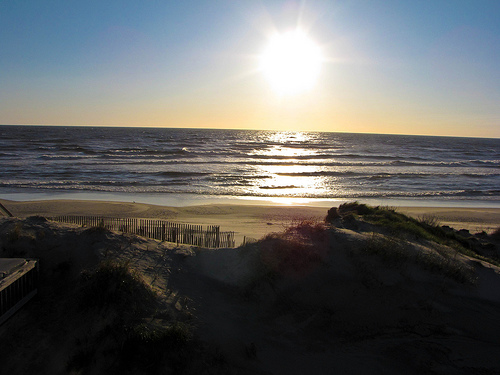[Grain of salt statement: This is something of a rant. It is my unqualified opinion, as I’m not an oil man and the only floating oil rig I’ve ever been on had been converted to a space launch platform. This post is for entertainment and stress-relief purposes only: primarily my own entertainment and stress relief.]
I fail to understand why British Petroleum hasn’t written off the failed Deepwater Horizon as a total loss and taken steps to entomb it forever in order to stop it from leaking. Instead, it seems to me, they’ve been working hard to save their equipment and preserve this particular access point by trying small-scale, piecemeal fixes. (Here’s a nice article about some of the methods they’ve tried.)
Note that I don’t fault them for their statements to the press or misunderstanding the magnitude of the problem. Long ago I learned from one of my commanders that in the first hours of any major crisis, nothing is correct. Nothing you know, and usually nothing you do, will be correct until the situation begins to sort itself out.
So I understand that the first thing for BP to do was to try to activate the so-called “blowout preventer” — the device that was supposed to keep a disaster like this from ever happening. But once that failed, and especially once the amount of oil emerging from the well was known to be far greater than anticipated, it seems it was time to stop pussyfooting around and squash the thing like an undersea bug.
The nearest metaphor I can come up with is that the Deepwater Horizon wellhead is like a coffee straw sticking out of a Dixie cup at the bottom of a really deep swimming pool, and we’ve been trying to plug that straw by dropping grains of sand into it. The objective should have been to leave the thing sunk and bury it forever.
I understand that forced-in drilling mud (which is a special mineral slurry used in oil extraction) could overcome the well pressure and stop the flow, and I understand that now they’re drilling relief wells (see this article) in order to pump in mud and eventually concrete, but those are delicate operations at a time when brute force seems necessary.
Maybe we — BP and all of us — should’ve been indelicate. It seems to me that we have seen too much footage of smart bombs going through windows, and have forgotten (or no longer believe) that sometimes overwhelming force is required to solve an intractable problem.
Why not drop something big and cylindrical like a farm silo down over the thing, right over the blowout preventer, stand it up on the ocean floor and dump concrete in it until the concrete spills over the top. If that doesn’t stop the oil from coming out — if the oil bubbles up through the concrete as it’s setting — build a bigger cylinder and drop that over the first one and fill it up, and so on until the thing is encased in as many cubic yards of concrete as it takes to stop it from leaking into the ocean. If we have to build a five-hundred-foot-tall mountain of concrete on the ocean floor to seal the thing up, it seems a lot better than hundreds of thousands of barrels of oil spreading across the water.
They could’ve cut their losses, learned a big lesson, and moved on to the next project. Instead, we’re all learning some much more difficult lessons ….









